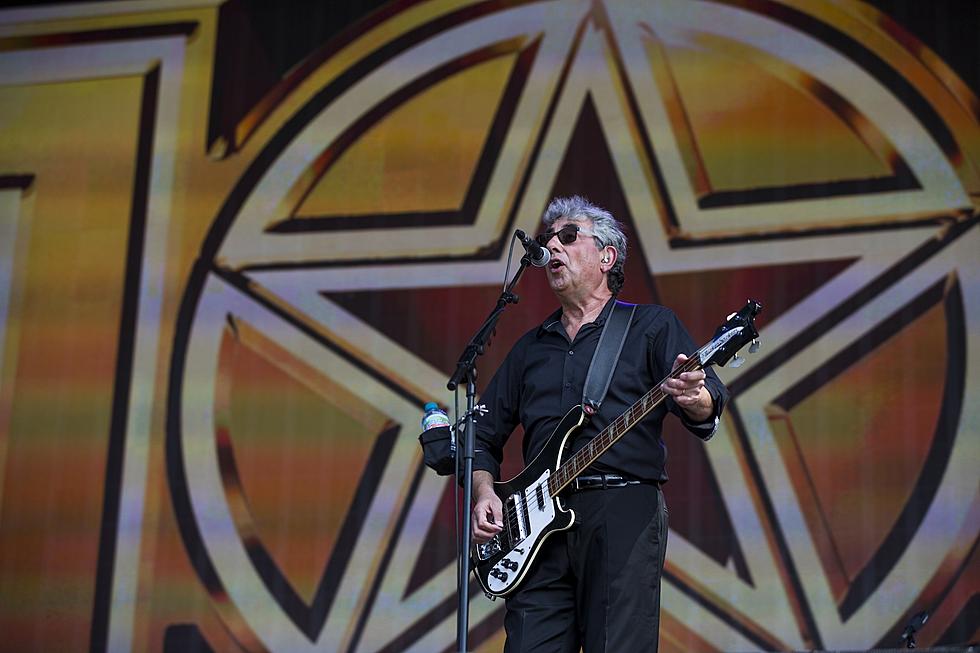40 Years Ago: 10cc Continue Their Eclectic Ways With ‘How Dare You!’
When they entered the studio in 1975 to record their fourth album, the members of 10cc were coming off their biggest hit yet — and, although no one knew it yet, they were also heading for a major split.
During the sessions for that album, titled How Dare You! and released in January 1976, 10cc saw their previous effort, The Original Soundtrack, soar up the charts on the strength of the hit singles "Life Is a Minestrone" and "I'm Not in Love." Still, as the band struggled to break even on tour in support of the LP, they couldn't help wondering when — or if — their years of work might translate into sustained mainstream success.
"We analyze ourselves a hell of a lot and we discuss the progression of other bands in terms of success, not in terms of musical quality," singer and multi-instrumentalist Eric Stewart told Melody Maker. "You see bands rise like rockets, whereas we creep up there slowly all the time. It's funny. You feel sometimes that you're never gonna be quite in that league, although you know deep down that your music is better than most of the people in that league."
Which is not to say that 10cc had been left completely languishing in the margins. Each of their first three albums made the Top 40 in their native U.K., with their two most recent releases hitting the Top 10, and they'd consistently enjoyed airplay on that side of the Atlantic, building a chain of hit singles that included "Donna," "Rubber Bullets," and "The Wall Street Shuffle." But prior to "I'm Not in Love," they'd been largely ignored by American radio; with How Dare You!, they found themselves in position to strengthen their grip on a continent of new fans.
Listen to "Art for Art's Sake"
To their credit, the band avoided whatever temptation there may have been to play it safe. Although all four members had served time in the trenches making anonymous work-for-hire pop songs, and had an obvious understanding of the mainstream songwriting formula, they'd plugged away at too many paycheck gigs to settle for a record they couldn't stand behind. As on previous outings, 10cc fashioned a pop/experimental hybrid with How Dare You!, fusing Stewart and Graham Gouldman's instincts for the accessible against Kevin Godley and Lol Creme's more esoteric musings.
"I think there's been a progression on every album and I think we've done it again. It's a strange mixture of songs," Gouldman told Melody Maker. "There's one about divorce, a song about schizophrenia, a song about wanting to rule the world, the inevitable money song, an instrumental."
The creative process behind the album was equally all over the map, with a fairly loose division of vocal and songwriting labor contributing to the wide-ranging flow of ideas.
"We usually start off in two pairs; Eric and myself, and Kev and Lol," Gouldman told ZigZag. "Those are the sort of 'name' writing teams – but later on, after writing three or four songs, we feel like a change and switch around .... we start talking to someone else about an idea – it's quite casual."
"It's one of the only bands in the world, if not the only band in the world, that's got four good writers," Creme argued to the NME. "We know the writers are good even if you don't like bits of this and bits of that. The writers are good. The musicians are good. The producers are good. That the four people can work together like this ... that has to be a unique situation and something that one should treasure."
Fans seemed to take Creme's words to heart after How Dare You! arrived in stores, sending it to the Top 5 in the U.K. and just outside the Top 40 in America. The album's two singles — "Art for Art's Sake" (No. 5) and "I'm Mandy, Fly Me" (No. 6) — continued the group's hot streak at home, but they found little traction in the States, perhaps owing to their lack of similarity to "I'm Not in Love." Still, even as consistent U.S. success continued to elude them, 10cc's best seemed yet to come.
Listen to "I'm Mandy, Fly Me"
Unfortunately, Creme's quote about the band's chemistry being "one to treasure" proved bitterly ironic in the months after How Dare You! was released. Shortly after starting work on songs for their next record, Godley and Creme split the band, going off as a duo and embarking upon a career that would bring them success — both as a recording act and as in-demand video directors — throughout the '80s. Having achieved a certain amount of commercial momentum, the two quickly found themselves worn down by the grind of maintaining it.
"In certain bands, like Talking Heads, the situation is loose enough for members to do their own projects every so often, and then re-group. But the pressure in 10cc to keep coming up with hits, the touring and recording just made it impossible for us," Godley claimed. "In order to grow, we had to leave, painful as it was."
After enduring a round of jokes from the music press about changing their name to 5cc, Gouldman and Stewart opted to continue the band without Godley and Creme, and initially, they picked right up where they left off — both 1977's Deceptive Bends and 1978's Bloody Tourists reached No. 3 in the U.K., and the 1976 single "The Things We Do for Love" gave the group another American Top Five hit. But their commercial fortunes entered a period of steep decline in the '80s, and after 1983's Windows in the Jungle, they went on extended hiatus. Various reunions have followed, and Gouldman has led his own version of the band since the late '90s, but it's never really been the same.
"They were just walking away from something so...big and successful," Stewart said years later. "We'd had great success around the world and I thought we were just breaking in a very, very big way. The collective dynamite of those four people, four people who could all write, who could all sing a hit song. In one band. I don't think that's ever been heard of before — well, the Beatles were of course on another planet anyway. But four guys who could write like that and do it all in-house, our own studio ... I just said, 'You're out of your minds for leaving this band.' We were on such a winning curve."
The Top 100 Albums of the '70s
More From Ultimate Classic Rock









